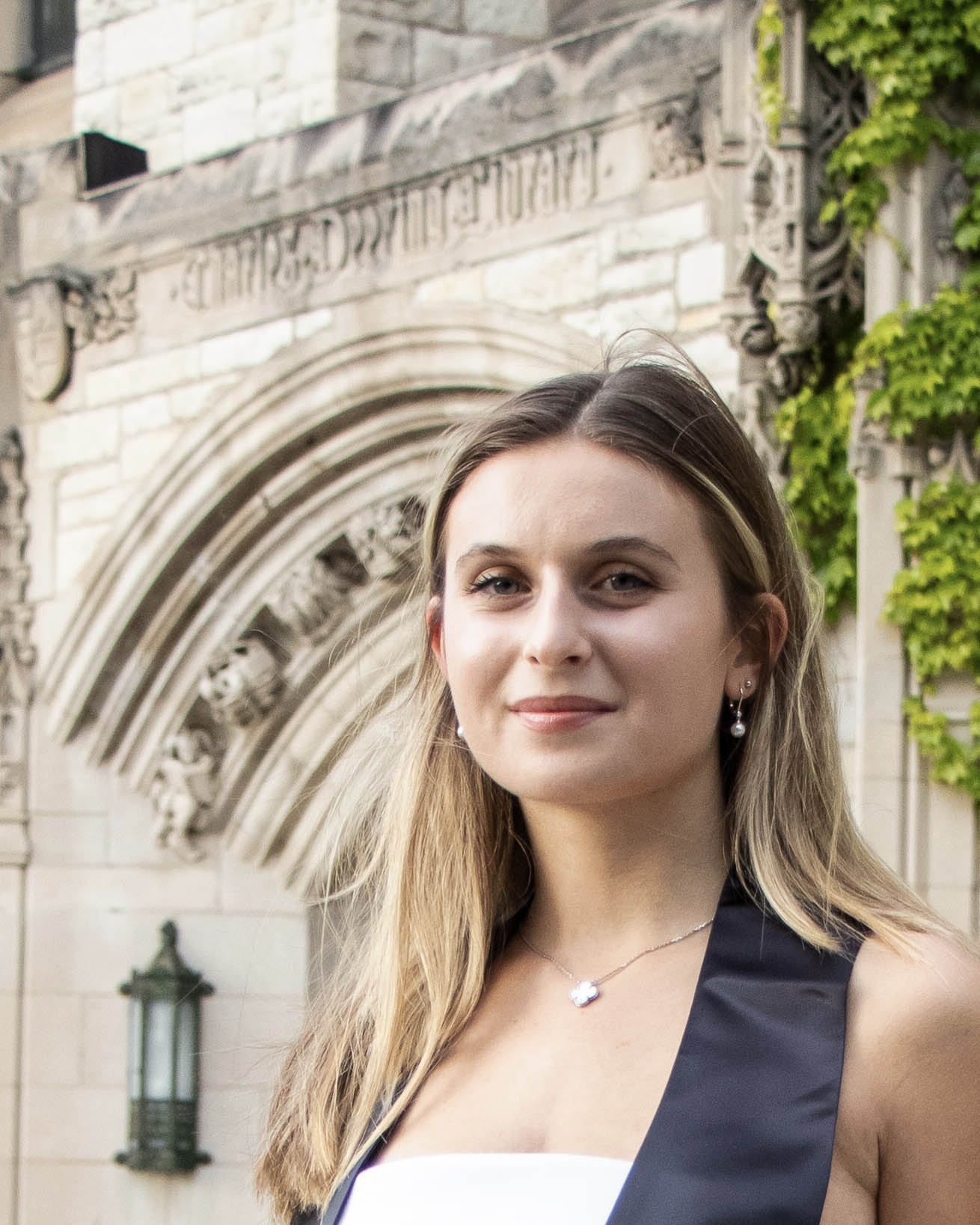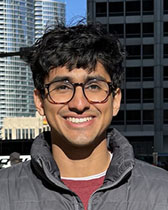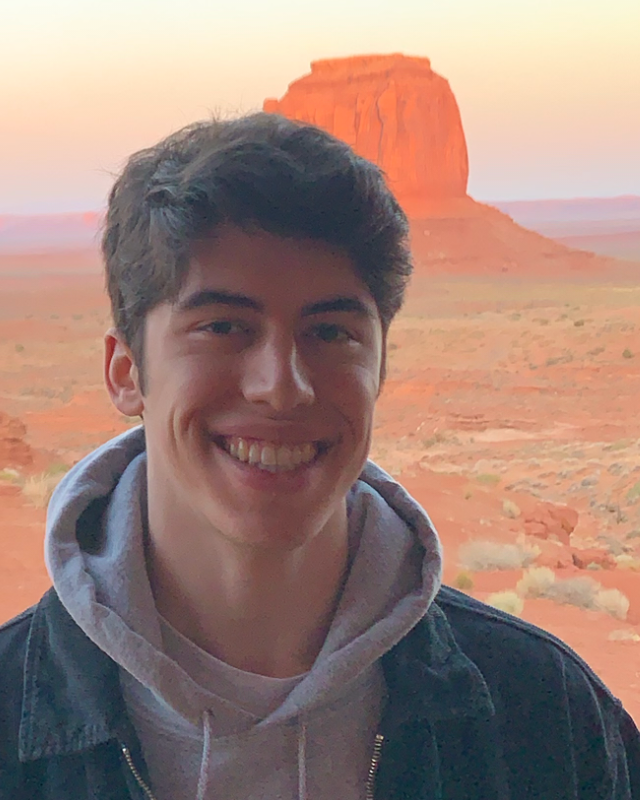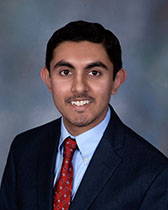Essay Prize and Winners
SHC Essay Prize
Each year SHC offers a prize of $200 for the best undergraduate essay, paper, or thesis that treats science, medicine, or technology in some historical, philosophical, or social context. The paper needs to have been written within the past year (that is, in the last year’s spring quarter, or in the fall, winter, or spring quarters of the current academic year). It does not have to be from an SHC approved course.
Students may nominate their own papers by submitting them to the SHC Administrator, Janet Hundrieser spring quarter each year. The prize committee will be constituted by the director of SHC, and the committee reserves the right to not award the prize in a given year or to choose more than one deserving candidate. Each recipient will receive $200.
SHC Certificate of Honor
Each year SHC offers a prize of $200 to the SHC adjunct major or minor who has demonstrated exemplary science studies citizenship and service at Northwestern. Students may nominate themselves, preparing a short write-up of the activities and events they have organized and presenting it to the SHC director by the end of the sixth week of spring quarter of each year. The prize committee will be constituted by the director of SHC, and the committee reserves the right not to award the prize in a given year or to choose more than one deserving candidate. Each recipient will receive $200.
2025
 Kayla Eichmann won the SHC essay prize for her paper, “A Khunian Approach to Understanding Artificial Intelligence,” written for Ben Lindquist’s class “History of AI.” The paper uses Thomas Kuhn’s famous model of scientific revolutions to understand the ways that the recent development of Large Language Model (LLM) versions of AI do (and don’t!) represent a paradigmatic revolution, when compared to prior forms of AI. It is a thoughtful and historically rich essay. She will be pursuing a Ph.D. in Theoretical Chemistry at the University of Chicago.
Kayla Eichmann won the SHC essay prize for her paper, “A Khunian Approach to Understanding Artificial Intelligence,” written for Ben Lindquist’s class “History of AI.” The paper uses Thomas Kuhn’s famous model of scientific revolutions to understand the ways that the recent development of Large Language Model (LLM) versions of AI do (and don’t!) represent a paradigmatic revolution, when compared to prior forms of AI. It is a thoughtful and historically rich essay. She will be pursuing a Ph.D. in Theoretical Chemistry at the University of Chicago.
 Anna Simmons received SHC's Certificate of Honor for her work studying the impact of human culture on marine ecosystems. This included working with the Garage start-up Explorate in Costa Rica; laboratory study of coral reefs; studies with Bahamanian marine scientists and fishermen; and volunteering for the Billion Oyster Project in the Hudson Valley of New York. She will continue working in urban health, with plans to pursue an education in maternal and environmental health.
Anna Simmons received SHC's Certificate of Honor for her work studying the impact of human culture on marine ecosystems. This included working with the Garage start-up Explorate in Costa Rica; laboratory study of coral reefs; studies with Bahamanian marine scientists and fishermen; and volunteering for the Billion Oyster Project in the Hudson Valley of New York. She will continue working in urban health, with plans to pursue an education in maternal and environmental health.
2024
 Josh Jerisha is a co-winner of the 2024 Essay Prize. His essay “20th Century Frontiers in Amateur Radio” is a sophisticated, revealing analysis of the evolution of ham radio in the last 120 years. Deftly weaving together a sociologically complex narrative of the evolution of the ham radio community with developments in telecommunications technology, its regulation, and wider social context, the essay reveals the tensions that are inherent in technical culture, as these (predominantly) male operators created a community based on both exclusivity and accessibility, using expert technical knowledge for amateur purposes and paradoxically creating intimate communities with common purpose across vast distances.
Josh Jerisha is a co-winner of the 2024 Essay Prize. His essay “20th Century Frontiers in Amateur Radio” is a sophisticated, revealing analysis of the evolution of ham radio in the last 120 years. Deftly weaving together a sociologically complex narrative of the evolution of the ham radio community with developments in telecommunications technology, its regulation, and wider social context, the essay reveals the tensions that are inherent in technical culture, as these (predominantly) male operators created a community based on both exclusivity and accessibility, using expert technical knowledge for amateur purposes and paradoxically creating intimate communities with common purpose across vast distances.
Aviva Kaplan is a co-winner of the 2024 Essay Prize. Her essay “Navigating Parenthood: Medical Challenges Faced by LGBTQ+ Couples and Individuals Trying to Conceive” foregrounds inequity in medical technology, specifically assisted reproductive technologies. Examining in detail the discriminatory nature of access to many reproductive technologies for intentional parents from the LGBTQ+ community. The essay clearly reveals how this discrimination is not simply created by legislative or economic barriers to access, but also due to more subtle barriers related to stigma, ignorance, and a heteronormative bias within healthcare settings.
 Kethan Bajaj received SHC's Certificate of Honor for his work in support of food allergy education and awareness. In addition to researching the social impact of food allergies with the Center for Food Allergy and Asthma Research (CFAAR), he has worked to summarize and share news and policy for mothers of children with food allergies and is co-founder of College Advocates for Food Allergy Awareness and Education (CAFAE), which aims to improve training, safety, and inclusiveness around food allergies at Northwestern and other college campuses
Kethan Bajaj received SHC's Certificate of Honor for his work in support of food allergy education and awareness. In addition to researching the social impact of food allergies with the Center for Food Allergy and Asthma Research (CFAAR), he has worked to summarize and share news and policy for mothers of children with food allergies and is co-founder of College Advocates for Food Allergy Awareness and Education (CAFAE), which aims to improve training, safety, and inclusiveness around food allergies at Northwestern and other college campuses
2023
 Emily Lam is the winner of the 2023 SHC essay prize for "Corporate Greed vs.
Emily Lam is the winner of the 2023 SHC essay prize for "Corporate Greed vs.
Human Lives: The Case of Insulin and Insulin Pumps." Drawing on an array
of source materials, the essay considers the co-production of technology
and human difference by considering inequities in access to insulin,
insulin pumps, and other insulin delivery tools in the United States.
 Irene Quan is the recipient of the SHC's Certificate of Honor for working on
Irene Quan is the recipient of the SHC's Certificate of Honor for working on
behalf of equity in health education and civic engagement. As founder
and director of Project MED (Medicine, Exposure, and Development), she
helped educate and prepare students from historically underrepresented
groups across four high schools for careers in health care. With the
Baxter Center of Science Education at Northwestern, she developed
programs to promote equity and representation in STEM education. And she
is a committed activist for menstrual equity and education among local
communities of women.
2022
 Sofie Kennedy is co-winner of the 2022 SHC essay prize for her essay “The Harmful Effects of Commercial Fishing Nets.” The essay deftly explores solutions for more sustainable industrial fishing and proposes a modification of the terms of the Paris Agreement to mitigate the disproportionate effects on small fisheries.
Sofie Kennedy is co-winner of the 2022 SHC essay prize for her essay “The Harmful Effects of Commercial Fishing Nets.” The essay deftly explores solutions for more sustainable industrial fishing and proposes a modification of the terms of the Paris Agreement to mitigate the disproportionate effects on small fisheries.
 Rebecca Wu is co-winner of the 2022 SHC essay prize for her essay “Mind-Body Dualism and the Making of Personhood.” Bringing together the stigmatization of mental illness, the dominance of productivity culture in the United States, and the concept of “brain death” in organ transplants, the essay finds legacies of mind-body dualism in the clinical emphasis on able, functioning bodies rather than healthy people.
Rebecca Wu is co-winner of the 2022 SHC essay prize for her essay “Mind-Body Dualism and the Making of Personhood.” Bringing together the stigmatization of mental illness, the dominance of productivity culture in the United States, and the concept of “brain death” in organ transplants, the essay finds legacies of mind-body dualism in the clinical emphasis on able, functioning bodies rather than healthy people.
 Eirene Fithian received SHC’s Certificate of Honor for her commitment to equity and improved health outcomes in Evanston and Chicago, as well as her service as representative to Weinberg’s Student Advisory Board for the Biology Department. As part of the Brady Scholars Program, a volunteer at Lurie Children’s Hospital, and team member at the Center for Food Allergy and Asthma Research (CFAAR), Eirene worked tirelessly to expand access to legal aid, collect data on racial disparities in the treatment of food allergies, and bridge the gap between Northwestern’s campus and the broader Evanston community.
Eirene Fithian received SHC’s Certificate of Honor for her commitment to equity and improved health outcomes in Evanston and Chicago, as well as her service as representative to Weinberg’s Student Advisory Board for the Biology Department. As part of the Brady Scholars Program, a volunteer at Lurie Children’s Hospital, and team member at the Center for Food Allergy and Asthma Research (CFAAR), Eirene worked tirelessly to expand access to legal aid, collect data on racial disparities in the treatment of food allergies, and bridge the gap between Northwestern’s campus and the broader Evanston community.
2021
 Amanda Davis is co-winner of the 2021 SHC essay prize for her senior thesis entitled “The History of a Graph: The STEM Gender-Equality Paradox and the People Who Made It." written under the direction of Prof. Sepehr Vakil (SESP). This closely analyzed thesis exposes the faulty assumptions behind the “gender-equality paradox” in STEM/ICT education, which purports to find that more gender-equal countries have relatively fewer female students graduating in STEM/ICT fields than do countries with less gender equality. Using a mix of historical, ethnographic, and statistical techniques, the thesis situates the paradox in its social and political context, documenting its analytic and intellectual limits, and then uses IRB-approved interviews with Moroccan women who are pursuing a bachelor's degree in computer science to show how poorly the paradox matches their experiences.
Amanda Davis is co-winner of the 2021 SHC essay prize for her senior thesis entitled “The History of a Graph: The STEM Gender-Equality Paradox and the People Who Made It." written under the direction of Prof. Sepehr Vakil (SESP). This closely analyzed thesis exposes the faulty assumptions behind the “gender-equality paradox” in STEM/ICT education, which purports to find that more gender-equal countries have relatively fewer female students graduating in STEM/ICT fields than do countries with less gender equality. Using a mix of historical, ethnographic, and statistical techniques, the thesis situates the paradox in its social and political context, documenting its analytic and intellectual limits, and then uses IRB-approved interviews with Moroccan women who are pursuing a bachelor's degree in computer science to show how poorly the paradox matches their experiences.
 Daniel Kiefus is co-winner of the 2021 SHC essay prize for his senior thesis entitled "Outrage and Inaction: How the United States Justifies Extraction and Poisoning on Diné (Navajo) Lands,” written under the direction of Prof. Doug Kiel (History). This closely analyzed and persuasive thesis uses the framework of settler colonialism to chronicle the economic and environmental devastation experienced by the Diné peoples over the past 80 years at the hands of the coal and uranium extractive industries. His thesis documents repeated failures of the U.S. government and corporate bodies to address the environmental harms done in Navajo lands, and argues that only tribal sovereignty can mitigate these harms to prevent future ones.
Daniel Kiefus is co-winner of the 2021 SHC essay prize for his senior thesis entitled "Outrage and Inaction: How the United States Justifies Extraction and Poisoning on Diné (Navajo) Lands,” written under the direction of Prof. Doug Kiel (History). This closely analyzed and persuasive thesis uses the framework of settler colonialism to chronicle the economic and environmental devastation experienced by the Diné peoples over the past 80 years at the hands of the coal and uranium extractive industries. His thesis documents repeated failures of the U.S. government and corporate bodies to address the environmental harms done in Navajo lands, and argues that only tribal sovereignty can mitigate these harms to prevent future ones.
 Anna Yang recieved the SHC Certificate of Honor as a first-generation college student for her sustained commitment to equity, especially in the fields of global medicine and health. In addition to her course work in SHC and Anthropology, she is an active leader in GlobeMed, as well as the co-founder of ExChange (advocating for equity for first gen students on NU campus) and Global Engagement Review (to address the challenges of “voluntourism”).
Anna Yang recieved the SHC Certificate of Honor as a first-generation college student for her sustained commitment to equity, especially in the fields of global medicine and health. In addition to her course work in SHC and Anthropology, she is an active leader in GlobeMed, as well as the co-founder of ExChange (advocating for equity for first gen students on NU campus) and Global Engagement Review (to address the challenges of “voluntourism”).
2020
 Anna Yang won the SHC student essay prize for her essay, "The Social Etymology of Trauma and Victimhood: A Case Study of the Border Crisis". This superbly written and clear essay presents a constructivist approach to victimhood, organized around the way that expert responses to migrant trauma reflect their sociopolitical context on the one hand, and influence public perceptions on the other. The essay skillfully combines dispassionate analysis and passionate engagement.
Anna Yang won the SHC student essay prize for her essay, "The Social Etymology of Trauma and Victimhood: A Case Study of the Border Crisis". This superbly written and clear essay presents a constructivist approach to victimhood, organized around the way that expert responses to migrant trauma reflect their sociopolitical context on the one hand, and influence public perceptions on the other. The essay skillfully combines dispassionate analysis and passionate engagement.
 Akshar Thakkar received the SHC student certificate of honor prize for his exemplary citizenship of this program, Northwestern University, and the wider community.
Akshar Thakkar received the SHC student certificate of honor prize for his exemplary citizenship of this program, Northwestern University, and the wider community.
He has served on the dean’s advisory council and the dean’s search committee for the School of Communication, and on Northwestern’s Cancer Outreach Prevention Program, as well as volunteered to help patients suffering from Alzheimer’s Disease. This award acknowledges his selfless civic engagement.
2019
 Ashorne Mahenthiran won the SHC student essay prize for his essay, “The Ethics of Embryos: An Evaluation of Whether Embryonic Stem Cell Research Should be Federally Funded.”
Ashorne Mahenthiran won the SHC student essay prize for his essay, “The Ethics of Embryos: An Evaluation of Whether Embryonic Stem Cell Research Should be Federally Funded.”
 Christina Shehata received the SHC student certificate of honor prize for her work as the program’s representative to the WCAS Student Advisor Board, as a co-director of the Community Health Corp. and as a member of the Executive Board of GlobalMed.
Christina Shehata received the SHC student certificate of honor prize for her work as the program’s representative to the WCAS Student Advisor Board, as a co-director of the Community Health Corp. and as a member of the Executive Board of GlobalMed.
2018
Shan Chen Pu and Mariel Soto Reyes received certificates of honor for their contributions as Student Advisory Board representatives.
2017
Rui Zhou Certificate of Honor for his contributions as a Student Advisory Board representative for SHC and his active participation in so many of SHC's events
2016
Erik Baker for his SHC honors thesis, “Ex Africa Semper Aliquid Novi : Consensus, Credibility, and Concern in the History of HIV/AIDS Origins Research” (Adviser: Steven Epstein)
2015
Anna Cassell, Essay Prize for her interdisciplinary honors thesis “‘Something is Really Wrong’: Evaluating Concussions and Early Retirement in Women’s Collegiate Soccer” (Advisers: Mark Sheldon and Helen Schwartzman)
Didi Odinkemelu, Certificate of Honor for her contributions as a Student Advisory Board representative for SHC and her work with the director on SHC special events.
2014
Stephanie Hong for her honors thesis, “Truth in Advertising? Owning ‘Public Interest’ in Congressional Debates Over Direct-to-Consumer Advertising (DTCA)” (Adviser: Mariana Craciun)
Mark Specht for his honors thesis, “The Moral Philosophies of Scientists” (Adviser: Mark Sheldon)
Chloe Woodhouse for her honors thesis, “Evaluating Meaningful Use of Electronic Medical Records: Does EMR Support Doctor-Doctor Communication in Referrals for Surgery?” (Adviser: Steve Epstein)
2013
Ari Lederman for his essay, "Containerization and Its Discontents: Opening American Globalization's Technology Black Box."
Amy Mangum for her essay, "Electronic Health Records: Transforming Health Care Delivery in America"
2012
Cari Romm for her SHC honors thesis, "'A Place Like This to Share How I Feel': Negotiating Stigma in Narratives of Abortion"
Chloe Woodhouse for her essay, "The Sexual Psychopath: Psychiatry and Law in the Treatment of Sex Offenders from 1930-1960"
2011
Marissa Konstadt for her SHC honors thesis, "H.G. Wells and the Popularization of the Scientific Method through Fiction
Benjamin Reisman for his essay, "Risks and Benefits: History and Policy Implications of FDA Reform, 1906-2010"
